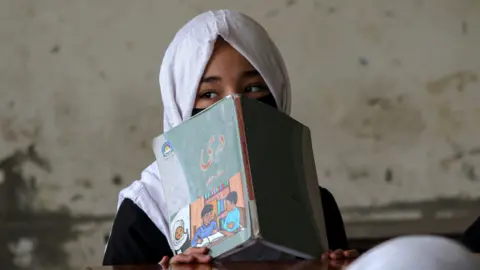The International Criminal Court (ICC) has made a significant move by issuing arrest warrants for two high-ranking leaders of the Taliban. This action stems from serious allegations of human rights violations, particularly against women and girls in Afghanistan. The warrants target Supreme Leader Haibatullah Akhundzada and Chief Justice Abdul Hakim Haqqani, who stand accused of committing crimes against humanity since the Taliban’s resurgence to power in 2021.
According to the ICC, there are “reasonable grounds” to believe that these leaders have perpetuated systematic abuses against women and girls. The Afghan government, under Taliban rule, has enacted numerous restrictions, with notable prohibitions on the access of girls above the age of twelve to education and on women participating in various jobs. This situation has sparked international concern, particularly focusing on the rights of women, which have been increasingly curtailed since the Taliban regained control.
In response to the ICC’s arrest warrants, the Taliban has declared that it does not recognize the authority of the ICC, describing the warrants as a “clear act of hostility” and an affront to the beliefs of Muslims worldwide. This strong denouncement from the Taliban reflects not only their position on international legal frameworks but also the broader ideological conflict regarding women’s rights and freedoms within the context of Afghan culture.
Beyond educational restrictions, the Taliban’s governance has instituted other severe limitations. Women are further restricted in their movements without a male guardian and face edicts forbidding them from raising their voices in public settings. The ICC’s statement highlights the targeted nature of these restrictions, emphasizing that while the Taliban’s rules affect the entire population, women and girls are uniquely oppressed based on their gender. Such systemic discrimination has been likened to “gender apartheid” by various human rights organizations including the United Nations.
The historical context of the detention of these Taliban leaders is critical. Haibatullah Akhundzada ascended to leadership in 2016 and has commanded the Taliban’s operations since the United States and allied forces withdrew from Afghanistan in August 2021. He is deeply entrenched in Islamist ideologies that promote a conservative interpretation of Islamic law. Alongside him, Abdul Hakim Haqqani has longstanding ties to the Taliban’s founder, Mullah Omar, and played an instrumental role in negotiations with the United States during the peace talks that culminated in the U.S. troop withdrawal.
The ICC’s decision comes following an announcement made earlier in the year by Prosecutor Karim Khan, who stated that these leaders are “criminally responsible” for a range of abuses, particularly against women and girls and those who do not adhere to the Taliban’s gender expectations. The Taliban’s Ministry of Foreign Affairs responded to these claims by accusing the ICC of neglecting alleged war crimes committed by foreign forces, particularly during the U.S. occupation.
Human Rights Watch has welcomed this development, urging the ICC to expand its focus beyond just the Taliban, advocating for justice for victims of various abuses in Afghanistan, including those perpetrated by Islamic State factions and prior Afghan security forces. The organization emphasized the need for equitable access to justice for victims of all perpetrators to prevent cycles of violence and impunity from perpetuating within the country.
The ICC plays a pivotal role in prosecuting those guilty of genocide, crimes against humanity, and war crimes, but lacks a dedicated enforcement body. Instead, the court relies on cooperation from member states to execute its warrants. As the warrants against Akhundzada and Haqqani unfold on the international stage, their implications for the future of women’s rights in Afghanistan, and the international community’s response, continue to develop amid a complex geopolitical landscape.











